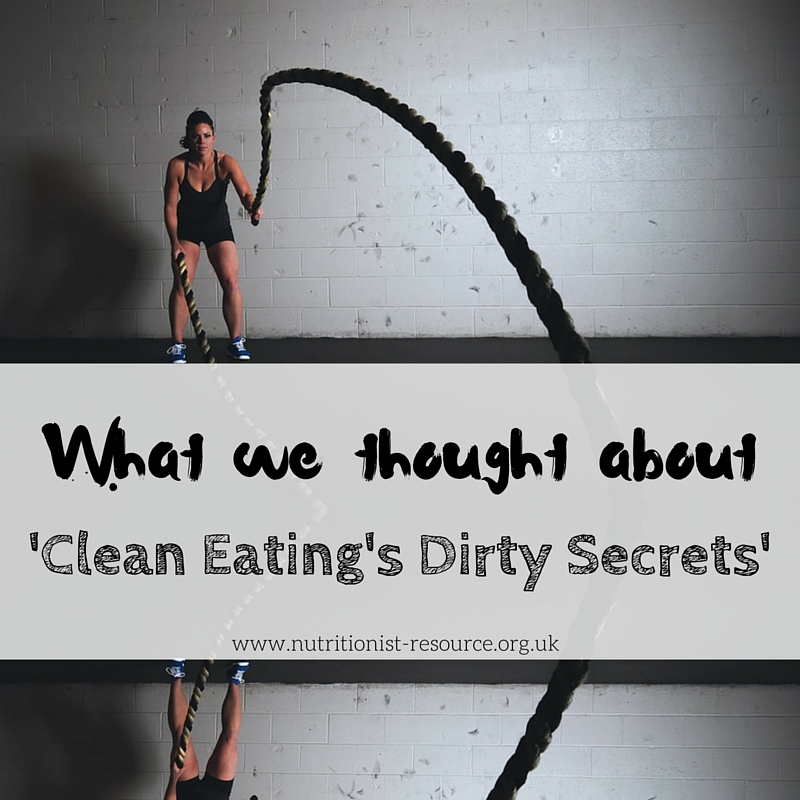Our discussion: “Clean Eating’s Dirty Secrets”
This month, BBC 3 released ‘Clean Eating’s Dirty Secrets’, a documentary exploring the explosive trend of clean-eating, veganism and specialist diets. While the documentary has had mixed reviews, it sparked discussion in the Nutritionist Resource office.

Internet sensation and body positive advocate, Grace Victory takes a deeper look into the clean-eating industry with the question, “Is this the lifestyle change we all need, or another fat diet in disguise – a fad diet with potentially dangerous consequences?”
From kale crisps and quinoa, to spiralisers and sweet potato brownies, the clean-eating world has skyrocketed. With food avoidance, Pinterest recipes, celebrity cookbooks and ‘good’, ‘bad’ or ‘cheat’ labelling, we are paying more attention than ever to what we are eating.
But is this really what ‘being healthy’ means?
James, Junior Software Engineer
“My sister is always telling me about the YouTubers she watches often talking about vegan diets. Lots of kids watch these videos too so regardless of whether the diets are good or bad, there’s more information out there that is more easily accessible. You don’t really have to go out of your way any more, often it is right in front of you on whatever social media tool you use.”
Carl, SEO Executive
“Social media now goes further than anyone would think, word of mouth is the most powerful advertiser. If your friends recommend a product or diet, you’re more likely to try it. With young people being able to communicate over so many new channels, it’s easier than ever. I think as long as the diet is balanced and safe, then it’s not a big concern, it’s when people diet for the wrong reasons or take things to the extreme that it can become dangerous.”
Kat, Marketing Communications Team Leader
“As someone who has had issues with eating in the past, I can see how the trend can be dangerous. Some YouTubers/Instagrammers etc. demonise certain foods and I think this can lead to warped thinking. There needs to be a balanced approach and an ‘everything in moderation’ mentality. I worry when chefs tell their fans to cut major food groups out, diet is such an individual thing and needs to be tailored and considered.”
Matt, Project Manager
“Personally (and I am no expert!) I think the whole ‘diet’ concept is wrong. Eating is a lifestyle based on a number of factors for each unique person. Also, many diets are fads that don’t take long to fall off of due to boredom, lack of choice or just fussiness.”
Barna, Designer and Developer
“I think what is missing from these programmes is that it is important to understand that changing your diet for two weeks won’t change your body. Even if you lose weight, feel and look better, you will get that weight back as long as you return to your previous, normal habit. Eating healthy doesn’t equal being healthy. Eating is just a part of our health, being healthy is a lifestyle that can’t be achieved with diet alone.”
Ben, Junior Software Engineer
“I think that people tend to trust and follow the ‘easy information’ that they can find around the internet, without going further and listening to the different, often opposing opinions about the subject, nor do they seek advice from a qualified dietitian or nutritionist. Maybe sometimes with these diets they can reach their weight-loss goals, but losing weight doesn’t always mean ‘gaining health’.”
Jo, Customer Service Manager
“Almost every clickbait site I have been on has something to do with a dietary fad (normally ‘Mother in Farnborough defies doctors with amazing new weight-loss discovery!’). These sites are posing as scientific resources when in fact, they’re just there to get people to sign-up to a subscriptions or whatever product they’re peddling. This preys on the insecurities and concerns of the public by targeting one of the biggest issues for most people, which is morally questionable. However, maybe more concerning is that, by representing a product as a scientific study, it’s really difficult for people to know whether a page is factual or not.
Likewise, no-one is policing social media, forums etc. – there’s no way to know who to trust, and this kind of guidance shouldn’t take the place of expert advice from a professional. It should be easier to check robust studies that either support or refute any kind of dietary plans – maybe an obligation to link to a reputable study on a known/established, neutral site that backs up the claims.”

Find a nutritionist dealing with Healthy eating
All nutrition professionals are verified





